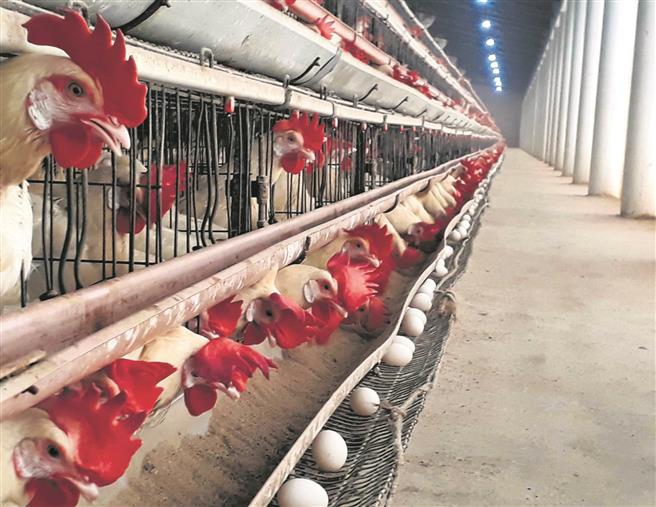
Sushil Manav
THE poultry industry in Haryana, like in other parts of the country, has been hit hard by the outbreak of coronavirus (Covid-19), amid rumours that the disease can be transmitted through consumption of chicken and other non-vegetarian food.
The prices of chicken and eggs have fallen considerably across the state, leading to financial losses to the poultry farmers.
“Our sales dipped by 70 to 80 per cent due to the coronavirus scare. The prices of poultry products have also fallen considerably,” says Surinder Bhutani, general secretary of the Central Haryana Poultry Farmers Association.
According to poultry industry sources, there are 2,000 poultry farmers in Haryana doing a business of Rs 7,000 crore.
“Under normal circumstances, we purchase one-day old layer chicks for Rs 45 apiece. After feeding the chick for four months, it becomes a bird worth Rs 300 and start giving an egg every 24 hours. It lays eggs for about a year and then was sold for Rs 45 to 50 for culling. The eggs used to sell for Rs 5 per piece in winters and between Rs 3.25 to 4 in summers. However, due to the impact of coronavirus scare, the prices of eggs have fallen to Rs 2.90 per unit and there were no takers for culling worthy birds even for a price as low as Rs 10 to 12,” says Bhutani.
Poultry farmers dealing with broilers are also facing the heat. According to broiler farming sources, the farmers used to buy a day-old broiler chick from the hatcheries for Rs 40-45. After feeding the chick for a month, it became a full-grown broiler weighing about 1.5 kg and fetched a price of Rs 80 per kg from the restaurant/eatery owners.
However, with a steep fall in the demand for chicken, broilers are not fetching more than Rs 25 per kg.
Hatchery farmers are equally distressed since their one-day-old broiler that costs Rs 20-25 and was selling for Rs 40-45 earlier, is not finding a customer even for Rs 3.
Bhutani says the poultry industry in Haryana was already reeling under losses due to a hike in the prices of feed and no rise in the rates of eggs, but now, the coronavirus panic has made their position even more vulnerable.
“The 2,000-odd poultry farmers from Haryana used to cater to the needs of customers not only from the state, but also from Delhi, Uttar Pradesh and Bihar. Now, the governments in Bihar and Uttar Pradesh have, under a policy to promote poultry farming, given a lot of incentives and subsidies to them. The demand of eggs from Haryana to those states has come down considerably now leading to the fall in the prices,” Bhutani adds.
Though medical experts have been dispelling rumours that non-vegetarian food or eggs can cause coronavirus infection, a majority of people have stopped eating chicken, mutton, eggs and other non-vegetarian food to be on the safe side.
While the poultry industry is badly hit by the coronavirus scare, there seems little impact on agricultural crops, particularly cotton and basmati, which are generally exported.
Mahesh Sharda, a leading exporter of cotton in Haryana, says coronavirus-related curbs are unlikely to have a major impact on the exports, with the shipments likely to be 42 lakh bales this time.
“The outbreak of coronavirus will not adversely affect exports as last year we did not ship much. We shipped only 8 lakh bales to China last year and this year we have already shipped 6 lakh bales till February-end. The pick-up in demand from other markets like Bangladesh will keep the exports at the same level as of last year. We are estimating exports for this season to be 42 lakh bales,” says a spokesperson for the Cotton Association of India.
Basmati exports, too, are likely to remain unaffected, according to trade sources.
Nathi Ram Gupta, president of the All India Rice Exporters Association, says the consignments of basmati rice to Middle East countries are going as usual.
“The only difference is that now, our members are avoiding travel to those countries,” he adds.
Send your feedback to [email protected]
Join Whatsapp Channel of The Tribune for latest updates.



























